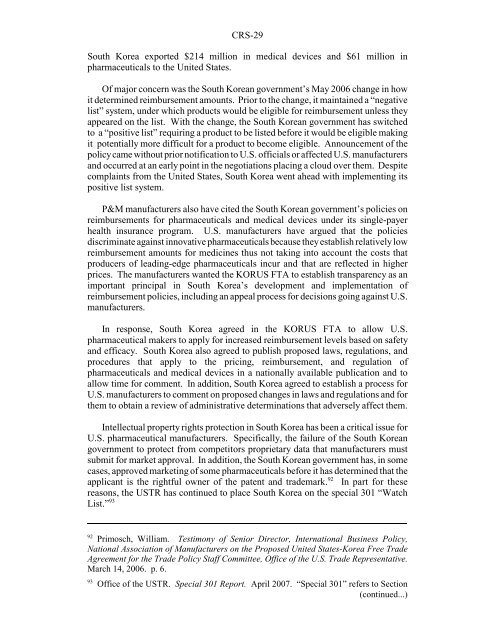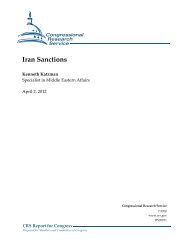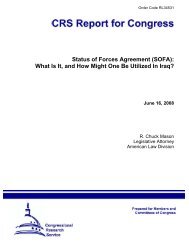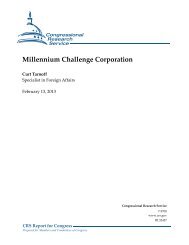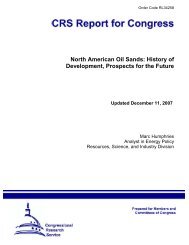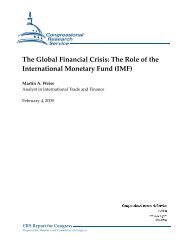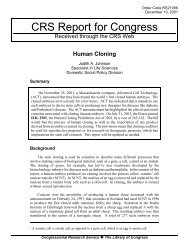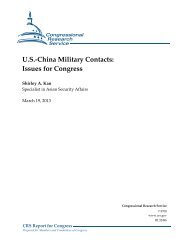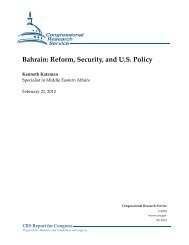The Proposed U.S.-South Korea Free Trade Agreement (KORUS ...
The Proposed U.S.-South Korea Free Trade Agreement (KORUS ...
The Proposed U.S.-South Korea Free Trade Agreement (KORUS ...
- TAGS
- korea
- fpc.state.gov
You also want an ePaper? Increase the reach of your titles
YUMPU automatically turns print PDFs into web optimized ePapers that Google loves.
CRS-29<br />
<strong>South</strong> <strong>Korea</strong> exported $214 million in medical devices and $61 million in<br />
pharmaceuticals to the United States.<br />
Of major concern was the <strong>South</strong> <strong>Korea</strong>n government’s May 2006 change in how<br />
it determined reimbursement amounts. Prior to the change, it maintained a “negative<br />
list” system, under which products would be eligible for reimbursement unless they<br />
appeared on the list. With the change, the <strong>South</strong> <strong>Korea</strong>n government has switched<br />
to a “positive list” requiring a product to be listed before it would be eligible making<br />
it potentially more difficult for a product to become eligible. Announcement of the<br />
policy came without prior notification to U.S. officials or affected U.S. manufacturers<br />
and occurred at an early point in the negotiations placing a cloud over them. Despite<br />
complaints from the United States, <strong>South</strong> <strong>Korea</strong> went ahead with implementing its<br />
positive list system.<br />
P&M manufacturers also have cited the <strong>South</strong> <strong>Korea</strong>n government’s policies on<br />
reimbursements for pharmaceuticals and medical devices under its single-payer<br />
health insurance program. U.S. manufacturers have argued that the policies<br />
discriminate against innovative pharmaceuticals because they establish relatively low<br />
reimbursement amounts for medicines thus not taking into account the costs that<br />
producers of leading-edge pharmaceuticals incur and that are reflected in higher<br />
prices. <strong>The</strong> manufacturers wanted the <strong>KORUS</strong> FTA to establish transparency as an<br />
important principal in <strong>South</strong> <strong>Korea</strong>’s development and implementation of<br />
reimbursement policies, including an appeal process for decisions going against U.S.<br />
manufacturers.<br />
In response, <strong>South</strong> <strong>Korea</strong> agreed in the <strong>KORUS</strong> FTA to allow U.S.<br />
pharmaceutical makers to apply for increased reimbursement levels based on safety<br />
and efficacy. <strong>South</strong> <strong>Korea</strong> also agreed to publish proposed laws, regulations, and<br />
procedures that apply to the pricing, reimbursement, and regulation of<br />
pharmaceuticals and medical devices in a nationally available publication and to<br />
allow time for comment. In addition, <strong>South</strong> <strong>Korea</strong> agreed to establish a process for<br />
U.S. manufacturers to comment on proposed changes in laws and regulations and for<br />
them to obtain a review of administrative determinations that adversely affect them.<br />
Intellectual property rights protection in <strong>South</strong> <strong>Korea</strong> has been a critical issue for<br />
U.S. pharmaceutical manufacturers. Specifically, the failure of the <strong>South</strong> <strong>Korea</strong>n<br />
government to protect from competitors proprietary data that manufacturers must<br />
submit for market approval. In addition, the <strong>South</strong> <strong>Korea</strong>n government has, in some<br />
cases, approved marketing of some pharmaceuticals before it has determined that the<br />
applicant is the rightful owner of the patent and trademark. 92 In part for these<br />
reasons, the USTR has continued to place <strong>South</strong> <strong>Korea</strong> on the special 301 “Watch<br />
List.” 93<br />
92 Primosch, William. Testimony of Senior Director, International Business Policy,<br />
National Association of Manufacturers on the <strong>Proposed</strong> United States-<strong>Korea</strong> <strong>Free</strong> <strong>Trade</strong><br />
<strong>Agreement</strong> for the <strong>Trade</strong> Policy Staff Committee, Office of the U.S. <strong>Trade</strong> Representative.<br />
March 14, 2006. p. 6.<br />
93 Office of the USTR. Special 301 Report. April 2007. “Special 301” refers to Section<br />
(continued...)


